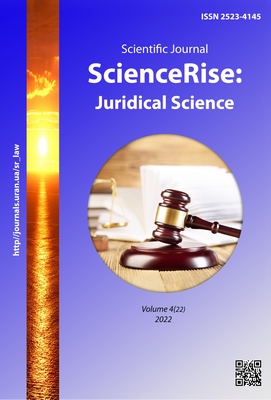Проблеми трансформації трудового законодавства відповідно до умов воєнного стану в Україні
DOI:
https://doi.org/10.15587/2523-4153.2022.270675Ключові слова:
трудові правовідносини, умови воєнного стану, трудові права працівника та роботодавця, трудовий договір, звільнення, вивільнення, оплата праціАнотація
Розкрито основні шляхи адаптації трудового законодавства відповідно до умов воєнного стану, проаналізовано нововведення й окремі питання змін у трудових правовідносинах в умовах воєнного стану в Україні. Оскільки питання обмеження, порушення та захисту трудових прав працівників, та розширення колатрудових прав роботодавців стали досить актуальними з настанням воєнного стану, автори акцентували увагу на важливих положеннях зміненого трудового законодавства та намагалися розтлумачити теоретичні та прикладні особливості застосування новел трудового законодавства. Адже воєнні часи вимагають прийняття складних і непопулярних рішень і в інших сферах життєдіяльності, зокрема, й у трудових відносинах. Досліджено основні аспекти трансформації трудового законодавства в умовах дії воєнного часу, розкрито зміст оновлених положень законодавства, а саме, про звільнення працівників, про процедуру призупинення трудового договору, оформлення простою та відпусток, про зміну умов оплати праці та про підвищення норм робочого часу. Проаналізовано позитивні та негативні сторонизмін трудового законодавства у такий скрутний для українського суспільства час. Разом із тим, автори статті розкрили механізми, що передбачені чинним законодавством про працю, котрі хоч і спрямовані на максимальне дотримання прав та гарантій для працівників, однак, не завжди можуть бути виконані роботодавцями в умовах воєнного стану
Посилання
- Pro orhanizatsiiu trudovykh vidnosyn v umovakh voiennoho stanu (2022). Zakon Ukrainy No. 2136-IX. 15.03.2022. Available at: https://zakon.rada.gov.ua/laws/show/2136-20#Text
- Pro derzhavnu sluzhbu (2015). Zakon Ukrainy No. 889-VIII. 10.12.2015. Available at: https://zakon.rada.gov.ua/laws/show/889-19#Text
- Pro sluzhbu v orhanakh mistsevoho samovriaduvannia (2001). Zakon Ukrainy No. 2493-III. 07.06.2001. Available at: https://zakon.rada.gov.ua/laws/show/2493-14#Text
- Konstytutsiia Ukrainy (1996). Zakon Ukrainy No. 254k/96-VR. 28.06.1996. Available at: https://zakon.rada.gov.ua/laws/show/254%D0%BA/96-%D0%B2%D1%80#Text
- Bolotina, N. B. (2008). Trudove pravo Ukrainy. Kyiv: Znannia, 860.
- Venedyktov, V. S. (2019). Suchasni kontseptualni pidkhody do vdoskonalennia trudovoho prava Ukrainy. Problemy realizatsii prav hromadian v sferi pratsi ta sotsialnoho zabezpechennia. Kharkiv: Pravo, 488–494.
- Harashchenko, L. P. (2003). Pravove rehuliuvannia vidpustok za zakonodavstvom Ukrainy. Kyiv: Red. hazety «Imenem Zakonu», Pavlim, 172.
- Zhernakov, V. V., Prylypko, S. M., Yaroshenko, O. M. et al.; Zhernakov, V. V. (Red.) (2012). Trudove pravo. Kharkiv: Pravo, 496.
- Zhernakov, V.V. (2017). Problemy zabezpechennia sotsialno-trudovykh prav u protsesi rozvytku zakonodavstva Ukrainy. Pravo ta innovatsii, 2 (18), 9–14.
- Inshyn, M. I.; Kostiuka, V. L., Melnyka, V. P. (Ed.) (2016). Trudove pravo Ukrainy. Kyiv: Tsentr uchbovoi literatury, 472.
- Kokhan, N. V. (2005). Rozvytok harantii trudovykh prav, peredbachenykh KonstytutsiieiuUkrainy ta chynnym zakonodavstvom pro pratsiu u suchasnyi period. Pravova derzhava, 16, 57–67
- Pylypenko, P. D., Buriak, V. Ya., Kozak, Z. Ya.; Pylypenko, P. D. (Ed.) Trudove pravo Ukrainy. Kyiv: In Yure, 548.
- Prylypko, S. M. et al. (2014). Trudove pravo Ukrainy. Kharkiv: Pravo, 757.
- Rotan, V. H., Zub, I. V., Sonin, O. Ye. (2011). Naukovo-praktychnyi komentar zakonodavstva Ukrainy pro pratsiu. Kyiv: Alerta, 672.
- Inshyn, M. I., Matsiuk, A. P., Sotskyi, A. M., Shcherbyna, V. I.; Matsiuk, A. R. (Ed.) (2015). Kurs porivnialnoho trudovoho prava. Vol. 1, 2. Kharkiv: Disa plius, 1056, 744.
- Zhernakov, V. V., Prylypko, S. M., Yaroshenko, O. M. (2012). Dohovirne rehuliuvannia vidnosyn u sferi pratsi. Dohovir yak universalna pravova konstruktsiia. Kharkiv: Pravo, 112–232.
- Zhernakov, V. V. (2005). Teoretychni ta praktychni pytannia instytutu zakhystu prav liudyny v sferi pratsi. Aktualni problemy derzhavy i prava, 25, 329–335.
- Trubitsyn, D. V. (2011). Vidstoronennia pratsivnyka vid roboty z initsiatyvy osib, yaki ne ye storonoiu trudovoho dohovoru. Derzhava i pravo. Yurydychni i politychni nauky, 51, 386–390.
- Khutorian, N. M. (2002). Teoretychni problemy materialnoi vidpovidalnosti storin trudovykh pravovidnosyn. Kyiv: Instytut derzhavy i prava im. V. M. Koretskoho NAN Ukrainy, 264.
- Yaroshenko, O. M. (Ed.) (2022). Trudove pravo Ukrainy. Kharkiv, 376.
- Yaroshenko, O. M. (2018). Aktualni pytannia praktyky prypynennia trudovoho dohovoru z pidstavy zakinchennia stroku. Pravo ta innovatsii, 3 (23), 117–122.
- Yaroshenko, O. M. (2013). Osnovni oznaky vidstoronennia pratsivnyka vid roboty: na prykladi vidminnostei vid sumizhnykh pravovykh yavyshch. Publichne pravo, 1 (9), 192–199.
- Kodeks zakoniv pro pratsiu Ukrainy (1971). Zakon Ukrainy No. 322-VIII. 10.12.1971. Available at: https://zakon.rada.gov.ua/laws/show/322-08#Text
- Pro voiennyi stan (2015). Zakon Ukrainy No. 389-VIII. 12.05.2015. Available at: https://zakon.rada.gov.ua/laws/show/389-19#Text
- Pro vnesennia zmin do deiakykh zakonodavchykh aktiv Ukrainy shchodo optymizatsii trudovykh vidnosyn (2022). Zakonom Ukrainy No. 2352-IX. 01.07.2022. Available at: https://zakon.rada.gov.ua/laws/show/2352-20#Text
- Pro vidpustky (1996). Zakon Ukrainy No. 504/96-VR. 15.11.1996. Available at: https://zakon.rada.gov.ua/laws/show/504/96-%D0%B2%D1%80#Text
##submission.downloads##
Опубліковано
Як цитувати
Номер
Розділ
Ліцензія
Авторське право (c) 2023 Natalia Khatniuk, Nelli Pobiianska, Nataliia Oblovatska

Ця робота ліцензується відповідно до Creative Commons Attribution 4.0 International License.
Наше видання використовує положення про авторські права Creative Commons CC BY для журналів відкритого доступу.
Автори, які публікуються у цьому журналі, погоджуються з наступними умовами:
1. Автори залишають за собою право на авторство своєї роботи та передають журналу право першої публікації цієї роботи на умовах ліцензії Creative Commons CC BY, котра дозволяє іншим особам вільно розповсюджувати опубліковану роботу з обов'язковим посиланням на авторів оригінальної роботи та першу публікацію роботи у цьому журналі.
2. Автори мають право укладати самостійні додаткові угоди щодо неексклюзивного розповсюдження роботи у тому вигляді, в якому вона була опублікована цим журналом (наприклад, розміщувати роботу в електронному сховищі установи або публікувати у складі монографії), за умови збереження посилання на першу публікацію роботи у цьому журналі.










